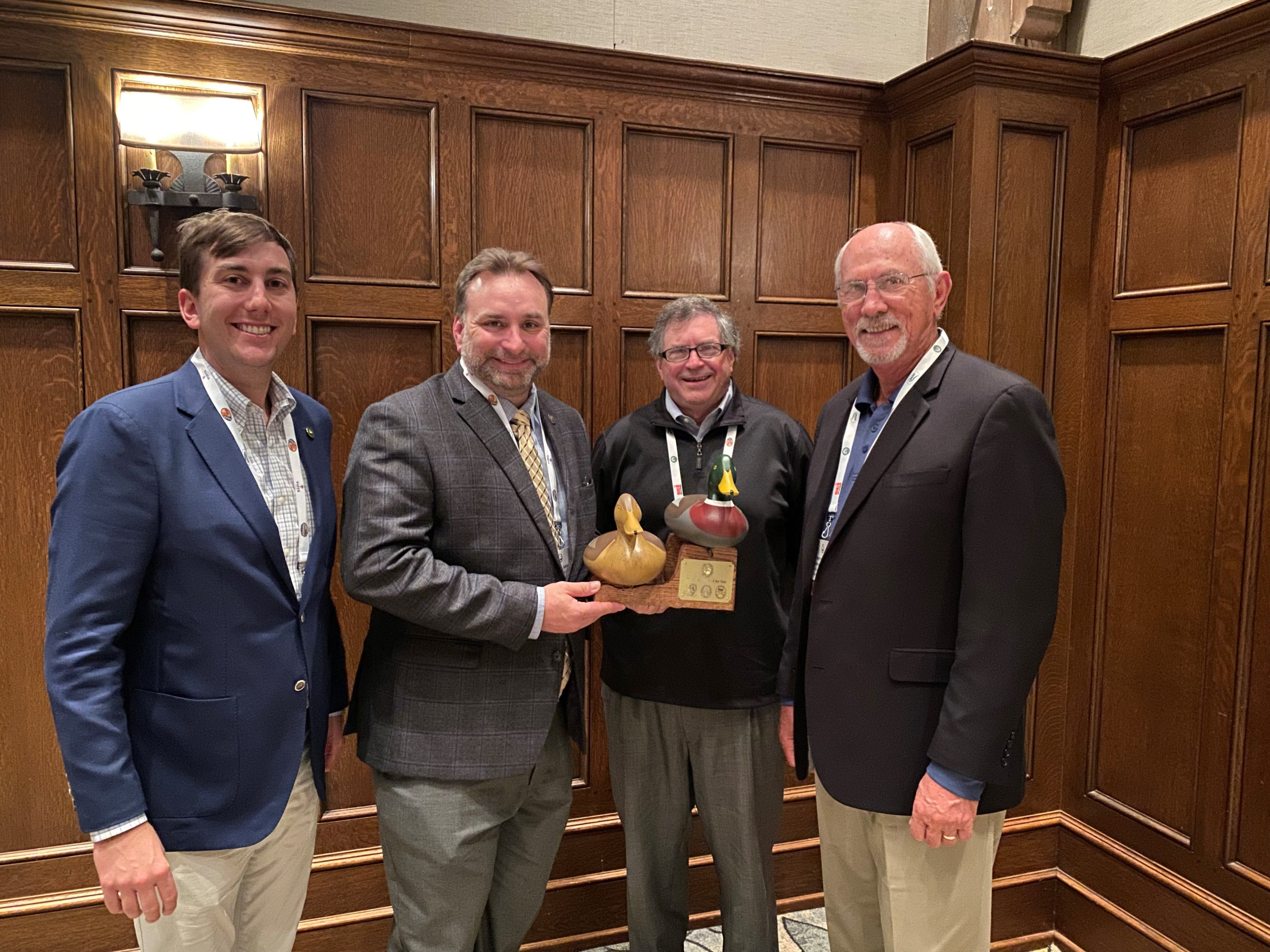By DAVID RAINER, Alabama Department of Conservation and Natural Resources
The Alabama Department of Conservation and Natural Resources recently received special recognition by the Congressional Sportsmen’s Foundation with the presentation of the State Agency of the Year Award at the 16th Annual National Assembly of Sportsmen’s Caucuses (NASC) Sportsman-Legislator Summit in Greensboro, Georgia.
“The Congressional Sportsmen’s Foundation (CSF) is honored to recognize the Alabama Department of Conservation and Natural Resources (DCNR) as the State Agency of the Year,” said Jeff Crane, CSF President. “The DCNR has been a consistent supporter of CSF, NASC, and the Alabama Legislative Sportsmen’s Caucus and, through this support, the Caucus in Alabama has grown tremendously to become a strong and effective voice for sportsmen and women.
“CSF thanks Commissioner Chris Blankenship, Deputy Commissioner Ed Poolos, and Wildlife and Freshwater Fisheries Director Chuck Sykes for their continued support and steadfast dedication to Alabama’s vast natural resources.”
Hosted by the CSF, this year's Summit brought together 50 legislators and leaders from state fish and wildlife agencies to discuss the theme "Partners Advancing America's Conservation Movement: NASC, Fish & Wildlife Agencies, Industry and NGOs." Topics discussed included promoting hunting and fishing, boating access, chronic wasting disease (CWD), the spread of invasive Asian carp and a variety of other issues affecting sportsmen and women.
"This is the largest gathering of pro-sportsmen legislators who come together to discuss issues that are of great importance to our hunting and angling traditions," Crane said. “The 16th Annual NASC Summit was successful in that it brought together our bipartisan caucus leaders and members, fish and wildlife agency leaders, NGO (non-governmental organizations) representatives, and leading industry partners to focus on how to advance opportunities for sportsmen and women and to ensure sound, science-driven conservation policies are enacted."
DCNR Commissioner Chris Blankenship said he was elated that the Department was awarded the CSF’s State Agency of the Year.
“We were very happy that we were recognized for multiple initiatives by the Department,” Commissioner Blankenship said. “The Foundation noted several reasons for the recognition, starting with Marine Resources Division Director Scott Bannon and all the work that has been done with red snapper. Alabama has been the leader in securing the state management of red snapper. The work we did in Congress helped inform the legislators on the issues on the Gulf Coast with the short seasons. We were able to work with the congressional delegations in Washington to implement the exempted fishing program (EFP) for the past two years and then win approval of management for the long-term.”
The EFP was in effect for the 2018 and 2019 red snapper seasons. Each of the Gulf states was given a snapper allocation, and each state managed its allocation.
Alabama’s quota was slightly more than a million pounds of red snapper in each of the two years of the EFP. The timely data from the mandatory Alabama Snapper Check program allowed Marine Resources to manage to the quota each year.
This year the Gulf of Mexico Fishery Management Council passed regional management of red snapper. That amendment is awaiting the signature of the Secretary of Commerce and will go into effect for 2020 and beyond.
“The Foundation also recognized the work that Wildlife and Freshwater Fisheries (WFF) Director Chuck Sykes is doing with Senator (Doug) Jones (D-Alabama) and Senator (Cindy) Hyde-Smith (R-Mississippi) concerning funding for CWD research as well as the work Chuck is doing as the president of SEAFWA (Southeastern Association of Fish and Wildlife Agencies) on a myriad of hunting and fishing initiatives,” Commissioner Blankenship said. “We have also worked with Senator (Richard) Shelby (R-Alabama) and, to a lesser extent, Senator (Lamar) Alexander (R-Tennessee) and Senator (Mitch) McConnell (R-Kentucky) on Asian carp issues. We want to reduce Asian carp populations in Tennessee and Kentucky rivers and keep them contained in the rivers upstream that flow into Alabama.”








